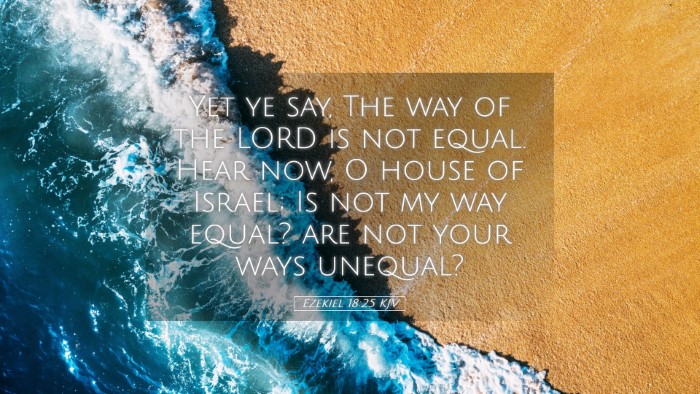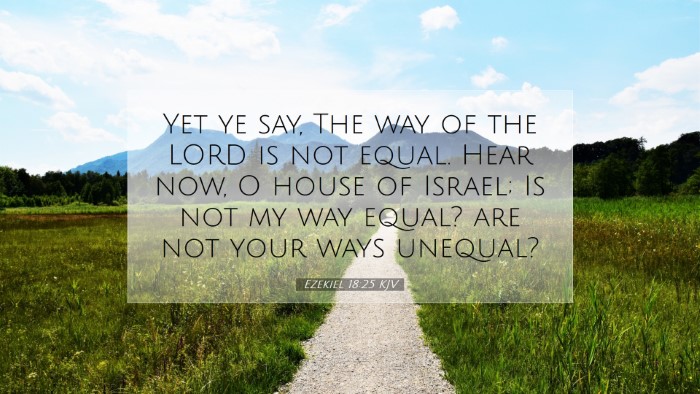Ezekiel 18:25 Commentary
Bible Verse: "Yet you say, 'The way of the Lord is not just.' Hear now, O house of Israel: Is My way not just? Is it not your ways that are not just?" (Ezekiel 18:25, NKJV)
Overview
The verse Ezekiel 18:25 serves as a critical point in Ezekiel's prophetic discourse addressing the people of Israel. Through this verse, God asserts the justice of His ways and invites His people to reflect upon their own actions.
Contextual Background
Ezekiel prophesied during a time of exile for the nation of Israel, specifically concerning their disbelief and misrepresentation of God's character. The contemporary audience includes the Israelites who, after suffering calamity, were inclined to question God's justice. The chapter seeks to clarify the nature of divine judgment versus human actions.
Historical Context
Understanding the historical context is crucial, as the Israelites had witnessed the destruction of Jerusalem and were grappling with their understanding of sin, punishment, and God's character. This verse directly responds to their objections regarding the fairness of God's judicial actions.
Theological Insights
This verse highlights several theological themes significant for pastors and scholars:
- The Justice of God: God's ways are inherently just, and He challenges His people to consider whether their grievances are legitimate.
- Human Accountability: This scripture emphasizes individual responsibility over communal guilt. Each person's actions determine their standing before God.
- Restoration and Repentance: The chapter outlines the possibility of repentance and restoration, shaped by personal accountability for one's sins.
Commentary Insights
Matthew Henry
Matthew Henry emphasizes the profound justice of God as unmoved by human inconsistencies. He points out that while the people lament God's judgments, they fail to recognize their unfaithfulness and disobedience. Henry concludes that humanity’s complaint of divine injustice often arises from a misunderstanding of God's nature and the true merit of their sinful actions.
Albert Barnes
Albert Barnes highlights that the Israelites' accusation of God's way being unjust stems from their inclination to view their circumstances without contemplating their own moral failures. Barnes asserts that divine justice is always measured against God's perfect holiness, contrasting with human frailty. He encourages a reconsideration of the way they evaluate justice, suggesting that it is their own ways that lead to consequences, not any fault in God's nature.
Adam Clarke
According to Adam Clarke, this verse reflects a fundamental truth: God's ways should not be compared to human standards of fairness. Clarke posits that the notion of injustice stems from a misapprehension of divine purpose. The people of Israel needed to recognize their role in the covenant relationship with God and respond accordingly with humility, acknowledging that they, not God, were responsible for their plight.
Application for Pastors and Theologians
This verse serves as a vital reminder for spiritual leaders and theologians about the importance of addressing misconceptions about divine justice. Here are some pertinent applications:
- Encouragement of Self-Examination: Pastors should encourage congregations to reflect on their actions and attitudes in light of God’s justice rather than blaming God for adversity.
- Clear Doctrinal Teaching: It is imperative to teach on the nature of God's justice, His holiness, and the call to repentance, which is foundational in biblical theology.
- Empowerment for Responsibilities: Reinforcing the idea that individuals are responsible for their choices can lead to a transformative understanding of God's grace and mercy.
Conclusion
Ezekiel 18:25 encapsulates the essence of God’s justice in contrast to human folly. As pastors and scholars dissect this text, it's essential to guide the faithful towards an understanding that reaffirming God’s righteous nature can lead them to genuine repentance and restoration. By engaging deeply with the wisdom found in these commentaries, one can challenge the misconceptions that often plague believers, ultimately inspiring a deeper faith rooted in the understanding of divine justice.


